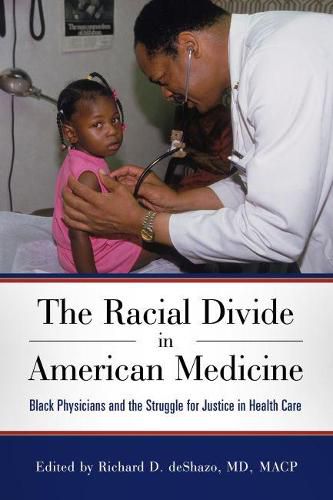Readings Newsletter
Become a Readings Member to make your shopping experience even easier.
Sign in or sign up for free!
You’re not far away from qualifying for FREE standard shipping within Australia
You’ve qualified for FREE standard shipping within Australia
The cart is loading…






This title is printed to order. This book may have been self-published. If so, we cannot guarantee the quality of the content. In the main most books will have gone through the editing process however some may not. We therefore suggest that you be aware of this before ordering this book. If in doubt check either the author or publisher’s details as we are unable to accept any returns unless they are faulty. Please contact us if you have any questions.
Contributions by Richard D. deShazo, John Dittmer, Keydron K. Guinn, Lucius M. Lampton, Wilson F. Minor, Rosemary Moak, Sara B. Parker, Wayne J. Riley, Leigh Baldwin Skipworth, Robert Smith, and William F. Winter The Racial Divide in American Medicine documents the struggle for equity in health and health care by African American citizens and physicians in Mississippi and the United States. Dr. Richard D. deShazo and the contributors to the volume trace the dark journey from a system of slave hospitals in the state, through Reconstruction, Jim Crow, and the civil rights era, to the present day. They substantiate that current health disparities in the state are directly linked to America’s history of separation, neglect, struggle, and disparities. Contributors reveal details of individual physicians’ journeys for recognition both as African Americans and as professionals in Mississippi. Despite discrimination by their white colleagues and threats of violence, a small but fearless group of African American physicians fought for desegregation of American medicine and society. For example, T. R. M. Howard, MD, in the all-black city of Mound Bayou led a private investigation of the Emmett Till murder that helped trigger the civil rights movement. Later, other black physicians risked their lives and practices to furnish care for white civil rights workers during the civil rights movement. DeShazo has assembled an accurate account of the lives and experiences of black physicians in Mississippi, one that gives full credit to the actions of these pioneers. DeShazo’s introduction and the essays address ongoing isolation and distrust among black and white colleagues in Mississippi. This book will stimulate dialogue, apology, and reconciliation, with the ultimate goal of improving disparities in health and health care and addressing long-standing injustices in our country.
$9.00 standard shipping within Australia
FREE standard shipping within Australia for orders over $100.00
Express & International shipping calculated at checkout
This title is printed to order. This book may have been self-published. If so, we cannot guarantee the quality of the content. In the main most books will have gone through the editing process however some may not. We therefore suggest that you be aware of this before ordering this book. If in doubt check either the author or publisher’s details as we are unable to accept any returns unless they are faulty. Please contact us if you have any questions.
Contributions by Richard D. deShazo, John Dittmer, Keydron K. Guinn, Lucius M. Lampton, Wilson F. Minor, Rosemary Moak, Sara B. Parker, Wayne J. Riley, Leigh Baldwin Skipworth, Robert Smith, and William F. Winter The Racial Divide in American Medicine documents the struggle for equity in health and health care by African American citizens and physicians in Mississippi and the United States. Dr. Richard D. deShazo and the contributors to the volume trace the dark journey from a system of slave hospitals in the state, through Reconstruction, Jim Crow, and the civil rights era, to the present day. They substantiate that current health disparities in the state are directly linked to America’s history of separation, neglect, struggle, and disparities. Contributors reveal details of individual physicians’ journeys for recognition both as African Americans and as professionals in Mississippi. Despite discrimination by their white colleagues and threats of violence, a small but fearless group of African American physicians fought for desegregation of American medicine and society. For example, T. R. M. Howard, MD, in the all-black city of Mound Bayou led a private investigation of the Emmett Till murder that helped trigger the civil rights movement. Later, other black physicians risked their lives and practices to furnish care for white civil rights workers during the civil rights movement. DeShazo has assembled an accurate account of the lives and experiences of black physicians in Mississippi, one that gives full credit to the actions of these pioneers. DeShazo’s introduction and the essays address ongoing isolation and distrust among black and white colleagues in Mississippi. This book will stimulate dialogue, apology, and reconciliation, with the ultimate goal of improving disparities in health and health care and addressing long-standing injustices in our country.